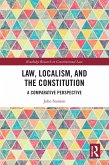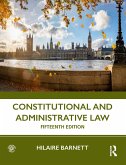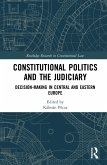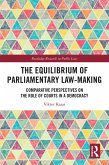Michael Zander
The Law-Making Process (eBook, ePUB)
46,95 €
46,95 €
inkl. MwSt.
Sofort per Download lieferbar

23 °P sammeln
46,95 €
Als Download kaufen

46,95 €
inkl. MwSt.
Sofort per Download lieferbar

23 °P sammeln
Jetzt verschenken
Alle Infos zum eBook verschenken
46,95 €
inkl. MwSt.
Sofort per Download lieferbar
Alle Infos zum eBook verschenken

23 °P sammeln
Michael Zander
The Law-Making Process (eBook, ePUB)
- Format: ePub
- Merkliste
- Auf die Merkliste
- Bewerten Bewerten
- Teilen
- Produkt teilen
- Produkterinnerung
- Produkterinnerung

Bitte loggen Sie sich zunächst in Ihr Kundenkonto ein oder registrieren Sie sich bei
bücher.de, um das eBook-Abo tolino select nutzen zu können.
Hier können Sie sich einloggen
Hier können Sie sich einloggen
Sie sind bereits eingeloggt. Klicken Sie auf 2. tolino select Abo, um fortzufahren.

Bitte loggen Sie sich zunächst in Ihr Kundenkonto ein oder registrieren Sie sich bei bücher.de, um das eBook-Abo tolino select nutzen zu können.
As a critical, in-depth analysis of the law-making process, this book has no equal.
It deals with all the stages and forms of law-making:
- the preparation of legislation;
- its passage through Parliament;
- statutory interpretation;
- the operation of the rules of precedent in judicial decision-making;
- the many facets of judicial law-making;
- the machinery of law reform.
The new eighth edition covers the operation of EU law in the UK after Brexit. It also covers pre-Brexit events such as the unprecedented legislation by backbench MPs to stop a No Deal Exit from…mehr
- Geräte: eReader
- mit Kopierschutz
- eBook Hilfe
- Größe: 1.19MB
Andere Kunden interessierten sich auch für
![Law, Localism, and the Constitution (eBook, ePUB) Law, Localism, and the Constitution (eBook, ePUB)]() John StantonLaw, Localism, and the Constitution (eBook, ePUB)40,95 €
John StantonLaw, Localism, and the Constitution (eBook, ePUB)40,95 €![Constitutional and Administrative Law (eBook, ePUB) Constitutional and Administrative Law (eBook, ePUB)]() Hilaire BarnettConstitutional and Administrative Law (eBook, ePUB)42,95 €
Hilaire BarnettConstitutional and Administrative Law (eBook, ePUB)42,95 €![The Constitution of the United Kingdom (eBook, ePUB) The Constitution of the United Kingdom (eBook, ePUB)]() Peter LeylandThe Constitution of the United Kingdom (eBook, ePUB)11,95 €
Peter LeylandThe Constitution of the United Kingdom (eBook, ePUB)11,95 €![Constitutional Politics and the Judiciary (eBook, ePUB) Constitutional Politics and the Judiciary (eBook, ePUB)]() Constitutional Politics and the Judiciary (eBook, ePUB)43,95 €
Constitutional Politics and the Judiciary (eBook, ePUB)43,95 €![Conflict, Power, and the Landscape of Constitutionalism (eBook, ePUB) Conflict, Power, and the Landscape of Constitutionalism (eBook, ePUB)]() Conflict, Power, and the Landscape of Constitutionalism (eBook, ePUB)23,95 €
Conflict, Power, and the Landscape of Constitutionalism (eBook, ePUB)23,95 €![The Equilibrium of Parliamentary Law-making (eBook, ePUB) The Equilibrium of Parliamentary Law-making (eBook, ePUB)]() Viktor KazaiThe Equilibrium of Parliamentary Law-making (eBook, ePUB)43,95 €
Viktor KazaiThe Equilibrium of Parliamentary Law-making (eBook, ePUB)43,95 €![The Judicial Mind (eBook, ePUB) The Judicial Mind (eBook, ePUB)]() The Judicial Mind (eBook, ePUB)37,95 €
The Judicial Mind (eBook, ePUB)37,95 €-
-
-
As a critical, in-depth analysis of the law-making process, this book has no equal.
It deals with all the stages and forms of law-making:
- the preparation of legislation;
- its passage through Parliament;
- statutory interpretation;
- the operation of the rules of precedent in judicial decision-making;
- the many facets of judicial law-making;
- the machinery of law reform.
The new eighth edition covers the operation of EU law in the UK after Brexit. It also covers pre-Brexit events such as the unprecedented legislation by backbench MPs to stop a No Deal Exit from the EU and the two great Supreme Court decisions over the triggering of Brexit and the prorogation of Parliament.
The books draws on a wide range of sources including important new empirical research such as Lord Sumption's 2019 Reith lectures (Trials of the State - Law and the Decline of Politics) and the work of Sir Geoffrey Palmer, former Prime Minister and Justice Minister of New Zealand on The Law Reform Enterprise.
There are new sections on the attempt to control the size of the House of Lords, on whether Parliament should have a role in the selection of senior judges and on the topical question whether decisions of the courts on constitutional questions are 'legal' or 'political'.
Hinweis: Dieser Artikel kann nur an eine deutsche Lieferadresse ausgeliefert werden.
It deals with all the stages and forms of law-making:
- the preparation of legislation;
- its passage through Parliament;
- statutory interpretation;
- the operation of the rules of precedent in judicial decision-making;
- the many facets of judicial law-making;
- the machinery of law reform.
The new eighth edition covers the operation of EU law in the UK after Brexit. It also covers pre-Brexit events such as the unprecedented legislation by backbench MPs to stop a No Deal Exit from the EU and the two great Supreme Court decisions over the triggering of Brexit and the prorogation of Parliament.
The books draws on a wide range of sources including important new empirical research such as Lord Sumption's 2019 Reith lectures (Trials of the State - Law and the Decline of Politics) and the work of Sir Geoffrey Palmer, former Prime Minister and Justice Minister of New Zealand on The Law Reform Enterprise.
There are new sections on the attempt to control the size of the House of Lords, on whether Parliament should have a role in the selection of senior judges and on the topical question whether decisions of the courts on constitutional questions are 'legal' or 'political'.
Hinweis: Dieser Artikel kann nur an eine deutsche Lieferadresse ausgeliefert werden.
Produktdetails
- Produktdetails
- Verlag: Bloomsbury UK eBooks
- Seitenzahl: 528
- Erscheinungstermin: 25. Juni 2020
- Englisch
- ISBN-13: 9781509934546
- Artikelnr.: 59618752
- Verlag: Bloomsbury UK eBooks
- Seitenzahl: 528
- Erscheinungstermin: 25. Juni 2020
- Englisch
- ISBN-13: 9781509934546
- Artikelnr.: 59618752
- Herstellerkennzeichnung Die Herstellerinformationen sind derzeit nicht verfügbar.
Michael Zander KC is Emeritus Professor at the London School of Economics and Political Science, where he taught from 1963 to 1988. His published books include Lawyers and the Public Interest (Weidenfeld & Nicolson,1968); Legal Services for the Community (Temple Smith,1978); A Matter of Justice (IB Tauris 1988); Cases and Materials on the English Legal System (10th edn, Cambridge, 2007); A Bill of Rights? (4th edn, Sweet & Maxwell, 1996); Zander on PACE (6th edn, Sweet & Maxwell, 2013); and the 1999 Hamlyn Lectures, The State of Justice (Sweet & Maxwell, 2000). He has conducted many empirical studies. He was a member of the Royal Commission on Criminal Justice (1991-93). For 25 years (1963-88) he was also Legal Correspondent of The Guardian and has been a frequent broadcaster on radio and television. He is acknowledged to be one of the foremost authorities on the workings of the legal system.
Summary of Contents 1. Legislation: The Whitehall Stage 1.1. The
Preparation of Legislation 1.2. Drafting Legislation 1.3. Criticism of the
Quality of Drafting 1.4. What to do about the Quality of the Statute Book?
1.5. The 'Good Law' Initiative 1.6. Final Approval before Introduction in
Parliament 2. Legislation: The Westminster Stage 2.1. The Legislative
Process 2.2. Legislative Committees 2.3. The Role of the Bill Team 2.4.
Interaction Between Interested Parties During the Legislative Process 2.5.
The Time Taken by Parliamentary Debates 2.6. The Impact on Bills of the
Parliamentary Process 2.7. The Composition and Size of the House of Lords
2.8. Publication of Bills in Draft Form 2.9. Carrying-Over Legislation from
One Session to Another 2.10. Control of Business 2.11. Control of the
Length of Debates 2.12. The Parliament Acts of 1911 and 1949 2.13.
Legislation in Haste 2.14. When does a Statute Come into Force? 2.15.
Statutes Online 2.16. The Reach of Legislation and Devolution 2.17.
Delegated Legislation 2.18. Rejecting Delegated Legislation 2.19. Scrutiny
of Delegated Legislation 2.20. Delegated Legislation: Anglo-American
Comparison 2.21. Making Better Law 3. Statutory Interpretation 3.1.
Interpretation is a Necessary Aspect of Communication 3.2. The Three Basic
So-Called 'Rules' of Statutory Interpretation 3.3. The Three Basic Rules
Considered 3.4. Understanding the Context: Statutes and Judicial Decisions
3.5. Understanding the Context: Evidence Beyond Statutes and Judicial
Decisions 3.6. Presumptions and Subordinate Principles of Interpretation as
an Aid to Construction 3.7. Are the Rules, Principles, Presumptions and
Other Guides to Interpretation Binding on the Courts? 3.8. Interpreting
Bills of Rights 3.9. What (if any) is the Function of General Statutory
Rules on Statutory Interpretation? 3.10. Do Statements of General Principle
Assist? 3.11. What is the Court's Proper Function in Interpreting a
Statute? 4. Binding Precedent: The Doctrine of Stare Decisis 4.1. The
Hierarchy of Courts and the Doctrine of Binding Precedent 4.2. A Comparison
with Some Other Countries 4.3. The European Court of Justice 4.4.
Devolution Issues 5. How Precedent Works 5.1. Professional Techniques for
Using Precedents 5.2. Preparation and Delivery of Judgments 5.3. Are
Precedents Law or Only Evidence of the Law? 5.4. The Values Promoted by the
System of Precedent 5.5. Flexibility and Stability in the Common Law System
6. Law Reporting 6.1. The History of Law Reporting 6.2. Criticisms of the
System 6.3. The Advent of Online Access to Law Reports 6.4. What Decisions
are Reported? 6.5. Too Many Unreported Decisions 6.6. Restricting the
Citation of Authorities 6.7. The Hierarchy of Reports 6.8. The Form of Law
Reports 7. The Nature of the Judicial Role in Law-Making 7.1. The Personal
Element in Judicial Law-Making 7.2. The Background of Judges 7.3. The
Appointment of Judges 7.3.1. The Lord Chancellor Replaced by a Judicial
Appointments 7.4. Do Judges have Biases? 7.5. Should Judges be Activist?
7.6. Can Judges Undertake their Own Researches into the Law? 7.7. What the
Law is and What it Ought to be 7.8. The Practical Effect of the
Retrospective Impact of Common Law Decisions 7.9. Prospective Overruling as
an Aid to Creative Law-Making 7.10. Legal Argument by Non-Parties 7.11.
Interaction between the Judge and the Advocate 7.12. The Trend Toward
Written Argument 7.13. Interaction between the Judges and their Judicial
Assistants 7.14. The Interaction between the Judges 7.15. The Role of the
Supreme Court 8. Foreign and Other Sources of Law 8.1. European Union Law
8.2. Scholarly Writings 8.3. Custom 8.4. Quasi-legislation, Codes of
Practice, Circulars, Guidance etc 9. The Process of Law Reform 9.1. The
History 9.2. The English and Scottish Law Commissions 9.3. The Law
Commission - Modern Developments 9.4. Judicial Law-Making in the Light of
the Existence of the Law Commission 9.5. The Law Commission and the
Codification Project 9.6. The Law Commission and Consultation
Preparation of Legislation 1.2. Drafting Legislation 1.3. Criticism of the
Quality of Drafting 1.4. What to do about the Quality of the Statute Book?
1.5. The 'Good Law' Initiative 1.6. Final Approval before Introduction in
Parliament 2. Legislation: The Westminster Stage 2.1. The Legislative
Process 2.2. Legislative Committees 2.3. The Role of the Bill Team 2.4.
Interaction Between Interested Parties During the Legislative Process 2.5.
The Time Taken by Parliamentary Debates 2.6. The Impact on Bills of the
Parliamentary Process 2.7. The Composition and Size of the House of Lords
2.8. Publication of Bills in Draft Form 2.9. Carrying-Over Legislation from
One Session to Another 2.10. Control of Business 2.11. Control of the
Length of Debates 2.12. The Parliament Acts of 1911 and 1949 2.13.
Legislation in Haste 2.14. When does a Statute Come into Force? 2.15.
Statutes Online 2.16. The Reach of Legislation and Devolution 2.17.
Delegated Legislation 2.18. Rejecting Delegated Legislation 2.19. Scrutiny
of Delegated Legislation 2.20. Delegated Legislation: Anglo-American
Comparison 2.21. Making Better Law 3. Statutory Interpretation 3.1.
Interpretation is a Necessary Aspect of Communication 3.2. The Three Basic
So-Called 'Rules' of Statutory Interpretation 3.3. The Three Basic Rules
Considered 3.4. Understanding the Context: Statutes and Judicial Decisions
3.5. Understanding the Context: Evidence Beyond Statutes and Judicial
Decisions 3.6. Presumptions and Subordinate Principles of Interpretation as
an Aid to Construction 3.7. Are the Rules, Principles, Presumptions and
Other Guides to Interpretation Binding on the Courts? 3.8. Interpreting
Bills of Rights 3.9. What (if any) is the Function of General Statutory
Rules on Statutory Interpretation? 3.10. Do Statements of General Principle
Assist? 3.11. What is the Court's Proper Function in Interpreting a
Statute? 4. Binding Precedent: The Doctrine of Stare Decisis 4.1. The
Hierarchy of Courts and the Doctrine of Binding Precedent 4.2. A Comparison
with Some Other Countries 4.3. The European Court of Justice 4.4.
Devolution Issues 5. How Precedent Works 5.1. Professional Techniques for
Using Precedents 5.2. Preparation and Delivery of Judgments 5.3. Are
Precedents Law or Only Evidence of the Law? 5.4. The Values Promoted by the
System of Precedent 5.5. Flexibility and Stability in the Common Law System
6. Law Reporting 6.1. The History of Law Reporting 6.2. Criticisms of the
System 6.3. The Advent of Online Access to Law Reports 6.4. What Decisions
are Reported? 6.5. Too Many Unreported Decisions 6.6. Restricting the
Citation of Authorities 6.7. The Hierarchy of Reports 6.8. The Form of Law
Reports 7. The Nature of the Judicial Role in Law-Making 7.1. The Personal
Element in Judicial Law-Making 7.2. The Background of Judges 7.3. The
Appointment of Judges 7.3.1. The Lord Chancellor Replaced by a Judicial
Appointments 7.4. Do Judges have Biases? 7.5. Should Judges be Activist?
7.6. Can Judges Undertake their Own Researches into the Law? 7.7. What the
Law is and What it Ought to be 7.8. The Practical Effect of the
Retrospective Impact of Common Law Decisions 7.9. Prospective Overruling as
an Aid to Creative Law-Making 7.10. Legal Argument by Non-Parties 7.11.
Interaction between the Judge and the Advocate 7.12. The Trend Toward
Written Argument 7.13. Interaction between the Judges and their Judicial
Assistants 7.14. The Interaction between the Judges 7.15. The Role of the
Supreme Court 8. Foreign and Other Sources of Law 8.1. European Union Law
8.2. Scholarly Writings 8.3. Custom 8.4. Quasi-legislation, Codes of
Practice, Circulars, Guidance etc 9. The Process of Law Reform 9.1. The
History 9.2. The English and Scottish Law Commissions 9.3. The Law
Commission - Modern Developments 9.4. Judicial Law-Making in the Light of
the Existence of the Law Commission 9.5. The Law Commission and the
Codification Project 9.6. The Law Commission and Consultation
Summary of Contents 1. Legislation: The Whitehall Stage 1.1. The
Preparation of Legislation 1.2. Drafting Legislation 1.3. Criticism of the
Quality of Drafting 1.4. What to do about the Quality of the Statute Book?
1.5. The 'Good Law' Initiative 1.6. Final Approval before Introduction in
Parliament 2. Legislation: The Westminster Stage 2.1. The Legislative
Process 2.2. Legislative Committees 2.3. The Role of the Bill Team 2.4.
Interaction Between Interested Parties During the Legislative Process 2.5.
The Time Taken by Parliamentary Debates 2.6. The Impact on Bills of the
Parliamentary Process 2.7. The Composition and Size of the House of Lords
2.8. Publication of Bills in Draft Form 2.9. Carrying-Over Legislation from
One Session to Another 2.10. Control of Business 2.11. Control of the
Length of Debates 2.12. The Parliament Acts of 1911 and 1949 2.13.
Legislation in Haste 2.14. When does a Statute Come into Force? 2.15.
Statutes Online 2.16. The Reach of Legislation and Devolution 2.17.
Delegated Legislation 2.18. Rejecting Delegated Legislation 2.19. Scrutiny
of Delegated Legislation 2.20. Delegated Legislation: Anglo-American
Comparison 2.21. Making Better Law 3. Statutory Interpretation 3.1.
Interpretation is a Necessary Aspect of Communication 3.2. The Three Basic
So-Called 'Rules' of Statutory Interpretation 3.3. The Three Basic Rules
Considered 3.4. Understanding the Context: Statutes and Judicial Decisions
3.5. Understanding the Context: Evidence Beyond Statutes and Judicial
Decisions 3.6. Presumptions and Subordinate Principles of Interpretation as
an Aid to Construction 3.7. Are the Rules, Principles, Presumptions and
Other Guides to Interpretation Binding on the Courts? 3.8. Interpreting
Bills of Rights 3.9. What (if any) is the Function of General Statutory
Rules on Statutory Interpretation? 3.10. Do Statements of General Principle
Assist? 3.11. What is the Court's Proper Function in Interpreting a
Statute? 4. Binding Precedent: The Doctrine of Stare Decisis 4.1. The
Hierarchy of Courts and the Doctrine of Binding Precedent 4.2. A Comparison
with Some Other Countries 4.3. The European Court of Justice 4.4.
Devolution Issues 5. How Precedent Works 5.1. Professional Techniques for
Using Precedents 5.2. Preparation and Delivery of Judgments 5.3. Are
Precedents Law or Only Evidence of the Law? 5.4. The Values Promoted by the
System of Precedent 5.5. Flexibility and Stability in the Common Law System
6. Law Reporting 6.1. The History of Law Reporting 6.2. Criticisms of the
System 6.3. The Advent of Online Access to Law Reports 6.4. What Decisions
are Reported? 6.5. Too Many Unreported Decisions 6.6. Restricting the
Citation of Authorities 6.7. The Hierarchy of Reports 6.8. The Form of Law
Reports 7. The Nature of the Judicial Role in Law-Making 7.1. The Personal
Element in Judicial Law-Making 7.2. The Background of Judges 7.3. The
Appointment of Judges 7.3.1. The Lord Chancellor Replaced by a Judicial
Appointments 7.4. Do Judges have Biases? 7.5. Should Judges be Activist?
7.6. Can Judges Undertake their Own Researches into the Law? 7.7. What the
Law is and What it Ought to be 7.8. The Practical Effect of the
Retrospective Impact of Common Law Decisions 7.9. Prospective Overruling as
an Aid to Creative Law-Making 7.10. Legal Argument by Non-Parties 7.11.
Interaction between the Judge and the Advocate 7.12. The Trend Toward
Written Argument 7.13. Interaction between the Judges and their Judicial
Assistants 7.14. The Interaction between the Judges 7.15. The Role of the
Supreme Court 8. Foreign and Other Sources of Law 8.1. European Union Law
8.2. Scholarly Writings 8.3. Custom 8.4. Quasi-legislation, Codes of
Practice, Circulars, Guidance etc 9. The Process of Law Reform 9.1. The
History 9.2. The English and Scottish Law Commissions 9.3. The Law
Commission - Modern Developments 9.4. Judicial Law-Making in the Light of
the Existence of the Law Commission 9.5. The Law Commission and the
Codification Project 9.6. The Law Commission and Consultation
Preparation of Legislation 1.2. Drafting Legislation 1.3. Criticism of the
Quality of Drafting 1.4. What to do about the Quality of the Statute Book?
1.5. The 'Good Law' Initiative 1.6. Final Approval before Introduction in
Parliament 2. Legislation: The Westminster Stage 2.1. The Legislative
Process 2.2. Legislative Committees 2.3. The Role of the Bill Team 2.4.
Interaction Between Interested Parties During the Legislative Process 2.5.
The Time Taken by Parliamentary Debates 2.6. The Impact on Bills of the
Parliamentary Process 2.7. The Composition and Size of the House of Lords
2.8. Publication of Bills in Draft Form 2.9. Carrying-Over Legislation from
One Session to Another 2.10. Control of Business 2.11. Control of the
Length of Debates 2.12. The Parliament Acts of 1911 and 1949 2.13.
Legislation in Haste 2.14. When does a Statute Come into Force? 2.15.
Statutes Online 2.16. The Reach of Legislation and Devolution 2.17.
Delegated Legislation 2.18. Rejecting Delegated Legislation 2.19. Scrutiny
of Delegated Legislation 2.20. Delegated Legislation: Anglo-American
Comparison 2.21. Making Better Law 3. Statutory Interpretation 3.1.
Interpretation is a Necessary Aspect of Communication 3.2. The Three Basic
So-Called 'Rules' of Statutory Interpretation 3.3. The Three Basic Rules
Considered 3.4. Understanding the Context: Statutes and Judicial Decisions
3.5. Understanding the Context: Evidence Beyond Statutes and Judicial
Decisions 3.6. Presumptions and Subordinate Principles of Interpretation as
an Aid to Construction 3.7. Are the Rules, Principles, Presumptions and
Other Guides to Interpretation Binding on the Courts? 3.8. Interpreting
Bills of Rights 3.9. What (if any) is the Function of General Statutory
Rules on Statutory Interpretation? 3.10. Do Statements of General Principle
Assist? 3.11. What is the Court's Proper Function in Interpreting a
Statute? 4. Binding Precedent: The Doctrine of Stare Decisis 4.1. The
Hierarchy of Courts and the Doctrine of Binding Precedent 4.2. A Comparison
with Some Other Countries 4.3. The European Court of Justice 4.4.
Devolution Issues 5. How Precedent Works 5.1. Professional Techniques for
Using Precedents 5.2. Preparation and Delivery of Judgments 5.3. Are
Precedents Law or Only Evidence of the Law? 5.4. The Values Promoted by the
System of Precedent 5.5. Flexibility and Stability in the Common Law System
6. Law Reporting 6.1. The History of Law Reporting 6.2. Criticisms of the
System 6.3. The Advent of Online Access to Law Reports 6.4. What Decisions
are Reported? 6.5. Too Many Unreported Decisions 6.6. Restricting the
Citation of Authorities 6.7. The Hierarchy of Reports 6.8. The Form of Law
Reports 7. The Nature of the Judicial Role in Law-Making 7.1. The Personal
Element in Judicial Law-Making 7.2. The Background of Judges 7.3. The
Appointment of Judges 7.3.1. The Lord Chancellor Replaced by a Judicial
Appointments 7.4. Do Judges have Biases? 7.5. Should Judges be Activist?
7.6. Can Judges Undertake their Own Researches into the Law? 7.7. What the
Law is and What it Ought to be 7.8. The Practical Effect of the
Retrospective Impact of Common Law Decisions 7.9. Prospective Overruling as
an Aid to Creative Law-Making 7.10. Legal Argument by Non-Parties 7.11.
Interaction between the Judge and the Advocate 7.12. The Trend Toward
Written Argument 7.13. Interaction between the Judges and their Judicial
Assistants 7.14. The Interaction between the Judges 7.15. The Role of the
Supreme Court 8. Foreign and Other Sources of Law 8.1. European Union Law
8.2. Scholarly Writings 8.3. Custom 8.4. Quasi-legislation, Codes of
Practice, Circulars, Guidance etc 9. The Process of Law Reform 9.1. The
History 9.2. The English and Scottish Law Commissions 9.3. The Law
Commission - Modern Developments 9.4. Judicial Law-Making in the Light of
the Existence of the Law Commission 9.5. The Law Commission and the
Codification Project 9.6. The Law Commission and Consultation







